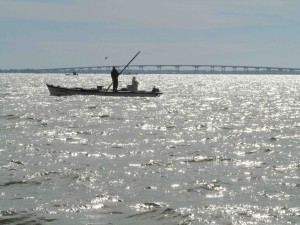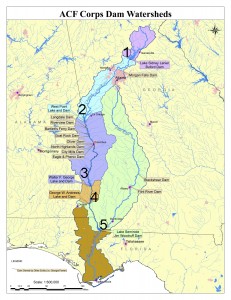BY BRUCE RITCHIE
FLORIDAENVIRONMENTS.COM
Apalachicola Bay seafood industry representatives said this week they’re concerned by a lack of action by Florida to protect oysters there while Georgia environmental groups critized their state for policies that the groups say are increasing tensions in the tri-state water wars.
Alabama, Florida and Georgia have been fighting in federal court since 1990 over water from the Apalachicola-Chattahoochee-Flint river system. On Oct. 1, 2013, Florida claimed that Georgia was wasting water and asked the U. S. Supreme Court to allocate water among the states.
Alabama and Georgia want water for cities and industry while Florida wants water to maintain the Apalachicola river ecology and the seafood industry around Apalachicola Bay.
Last year, the U. S. Department of Commerce declared a fishery disaster for Apalachicola Bay oysters for what Florida officials initially blamed on lack of fresh water flowing from Georgia and overfishing.
On Sept. 24, the Apalachicola Bay Oyster Dealers Association and the Seafood Management Assistance Resource and Recovery Team (SMARRT) sent separate letters to state officials asking them to close the bay to oyster harvesting for the rest of 2014 to allow smaller oysters to grow and avoid overfishing.
This week, Shannon Hartsfield, president of the Franklin County Seafood Workers Association, said state officials had responded that they are not taking action.
“I will be honest with you, the damage has been done at Cat Point,” Hartsfield said Monday during a meeting in Apalachicola, referring to a key winter oyster harvesting area.
“I think it was a big mistake by them not to close it,” responded Tommy Ward, president of the Apalachicola Bay Oyster Dealers Association. “Like you said, the damage is done and is being done every day they leave it open.”

But state wildlife officials who regulate oyster harvesting said they are increasing enforcement of regulations to reduce harvesting undersized oysters, but need more time to evaluate other options.
“Our thought process was it’s a pretty drastic thing to tell people they can’t make a living number one,” Jim Estes of the Florida Fish and Wildlife Conservation Commission told the SMARRT group meeting on Monday.
“I think you will see, if you haven’t yet, you will be seeing a lot more law enforcement presence on the bay,” Estes said. “That is one attempt to go do that. That doesn’t mean the bay won’t be closed sooner or later.”
The Franklin County Seafood Workers Association hasn’t taken a position on closing the bay, Hartsfield said. An association meeting on the topic on Sept. 19 turned into a shouting match as some oystermen objected to the idea of closing the bay.
On Wednesday, the Georgia Water Coalition released its third annual “Dirty Dozen” report on threats to Georgia waterways. They said statewide issues affecting the Chattahoochee River and the Floridan Aquifer also affect water flowing to Florida.
The statewide policies include a water supply program initiated by Georgia Gov. Nathan Deal that has included $196 million for dams and reservoirs around the state, including some on the Chattahoochee and Flint Rivers.
“That only aggravates this two-decade long water war,” Joe Cook of the Coosa River Basin Initiative in Georgia told reporters. “What Georgia should do is we should put a moratorium on funding any new reservoirs until we find out how much water we can reasonably take from the big federal reservoirs.”
Those reservoirs are Lake Lanier, the big federal reservoir on the Chattahoochee River north of Atlanta, and Lake Allatoona upstream of the Coosa River, which flows into Alabama but not into Florida.
Another “Dirty Dozen” issue affecting Florida is a proposal in Baker County in Southwest Georgia to store water from the Floridan Aquifer to use it to supplement Flint River flow during droughts, said Gordon Rogers of the Flint Riverkeeper group.
And the proposed Sabal Trail natural gas pipeline across Southwest Georgia and North Florida also could affect groundwater and rivers flowing into Florida, said John Quarterman of the WWALS Watershed Coalition.
A spokeswoman for Deal, the Georgia governor, called the report a “slanted political attack” coming two weeks before the election in Georgia. She said one of the proposed reservoirs, the Glades Reservoir on a tributary of the Chattahoochee River in Hall County, “is important for augmenting the flow of the entire basin.”
“(Governor) Deal’s water program will provide for Georgians’ water needs — which are critical to families and to economic development — for more than half a century,” spokeswoman Sasha Dlugolenski said. “It’s a tremendous investment in our future.”
(Story and photos copyrighted by Bruce Ritchie and Floridaenvironments.com. Do not copy, forward or republish without permission, which can be obtained from bruceBritchie@gmail.com.)

